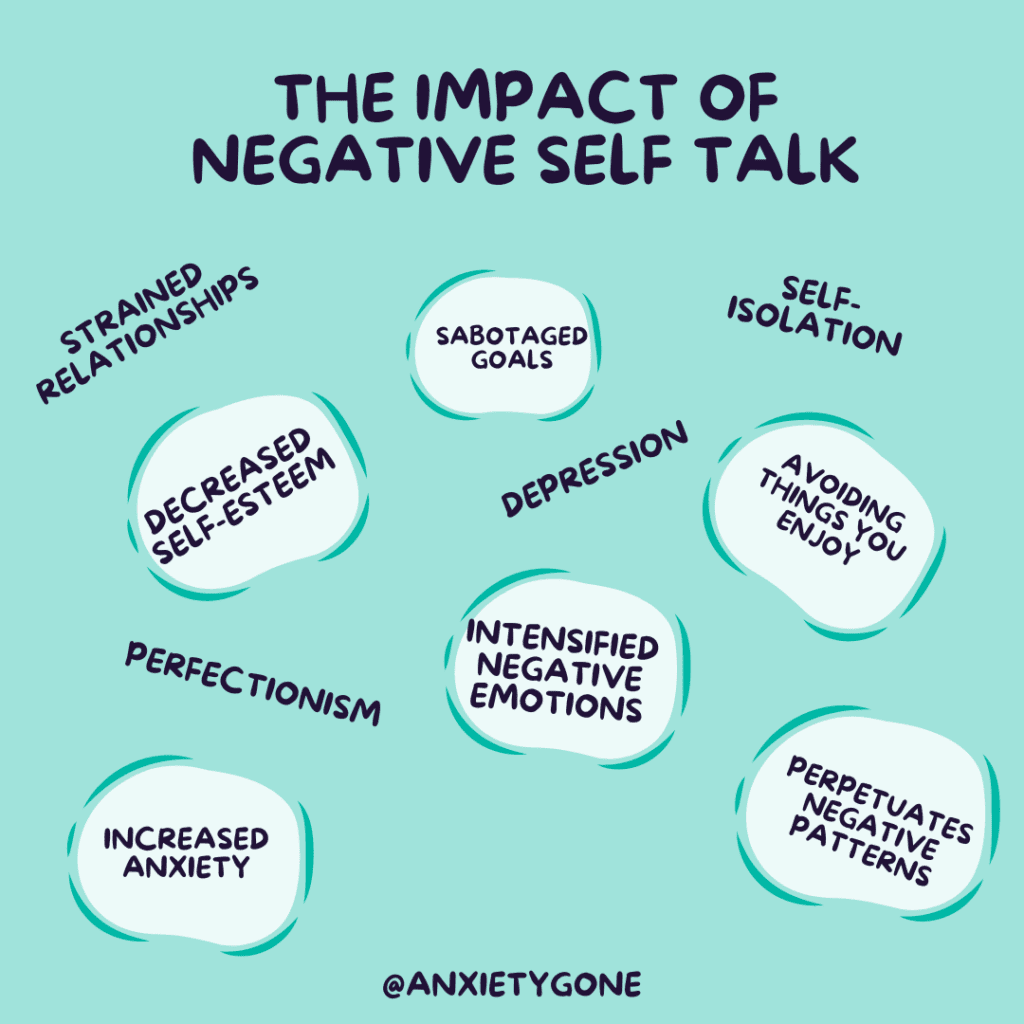Full Disclosure: Clicking on these links could mean a tiny commission for me, at no extra cost to you.
Advertisement
Feeling Stuck or Overwhelmed?
You don’t have to navigate it alone. With BetterHelp, you can connect with a licensed therapist who gets it, all from the comfort of your own space.
It’s flexible, private, and designed to fit into your life. Get matched in minutes and start feeling supported, whether you're managing anxiety, stress, or just trying to find your footing again. Plans start at $65/week. No waiting rooms. No judgment. Just real help, when you need it.
How Negative Self-Talk is Different From Repetitive, Intrusive or Negative Thoughts
While negative self talk often overlaps with other difficult thought patterns, it’s important to understand the difference, especially when you’re trying to manage your mental health or anxiety. W
Negative self talk is the inner critic. It’s the voice that evaluates, judges, and undermines your worth. Think: “I’m so stupid,” “I can’t do anything right,” or “No one likes me.” It’s conversational, internalized, and often reflects deep-rooted beliefs about yourself. It feels personal because it is—you’re talking to yourself in a way you never would to someone else.
In contrast, repetitive thoughts can be neutral or negative, but they’re mainly characterized by their looping nature. For example, going over the same worry about a conversation or upcoming event again and again. They’re exhausting but not always self-directed.
Intrusive thoughts are usually unwanted, distressing, and often feel completely out of character. These thoughts can be violent, inappropriate, or irrational—and they can cause intense shame or fear. They’re not a sign of who you are; they’re a common symptom of anxiety disorders, OCD, or trauma.
Negative thoughts, more broadly, can refer to any pessimistic or fear-based thinking, andnot necessarily self-critical. These might include general fears about the world, worries about the future, or judgments about others.
Understanding these differences helps you target the right coping strategy. For example, fidget rings and grounding tools might help manage repetitive or anxious thoughts, while self-compassion techniques are more effective for combatting negative self talk.
How Negative Self Talk Affects You
Negative self talk may feel like background noise, but its impact is deep and lasting. Over time, it can shape how you think, feel, and interact with the world around you. Here’s how:
-
Lowers self-esteem: You begin to doubt your worth and capabilities.
-
Increases anxiety and depression: Constant criticism fuels mental health struggles.
-
Promotes avoidance: You might shy away from opportunities due to fear of failure.
-
Leads to self-sabotage: Negative beliefs can block you from achieving goals.
-
Strains relationships: Insecurity and self-doubt affect how you connect with others.
-
Impacts daily functioning: You may feel drained, indecisive, or stuck in overthinking loops.
-
Career Setbacks: Self-doubt may prevent you from seizing opportunities or speaking up.
-
Decreased Performance: Negative thinking impacts focus, motivation, and decision-making.
-
Reinforces Toxic Patterns: It creates a loop of self-doubt and pessimism.
-
Blocks Personal Goals: Self-imposed limitations make it harder to achieve your potential.
-
Becomes automatic: The more it happens, the more natural it feels—until it becomes your default.
How to Recognize Negative Self-Talk
Talking negatively about yourself can be so habitual that you don’t even realize it’s happening. It often disguises itself as “being realistic” or “just trying to do better,” but the truth is, it’s a quiet sabotage of your confidence. That’s why awareness is everything. Once you learn to spot that inner critic, you can start shifting the conversation.
Here’s how to recognize when negative self talk is taking the wheel:
-
You catch yourself using harsh, absolute language like “I always mess up” or “I’ll never be good enough.”
-
You’re quick to blame yourself for things outside of your control.
-
You replay mistakes over and over, long after the moment has passed.
-
You dismiss compliments or achievements, thinking you “just got lucky.”
-
You talk to yourself in ways you’d never talk to a friend.
-
You catastrophize small issues, turning them into worst-case scenarios in your mind.
-
You feel emotionally drained after your own internal monologue.
These signs might seem small, but they add up and they can heavily influence your mood, confidence, and anxiety levels. The next time you notice these patterns, pause and ask: Would I say this to someone I love?
And if the answer is no, it’s time to start rewriting the script with kindness, compassion, and maybe a spin or two of your spinner ring to ground you back into the present moment.
Bonus Tip: Keeping a journal or jotting down your thoughts in our printable overthinking workbook can be immensely helpful in this process.
Become Your Best Self
It’s time to prioritize you. The Silk + Sonder Journal is your guided companion for emotional healing, mental clarity, and lasting self-love. With daily therapeutic prompts and wellness rituals, each page helps you reflect, reset, and reconnect with your best self.
Ready to experience the power of intentional self-care? Join thousands already transforming their lives with this beautifully curated journal.
How To Stop Talking Badly About Yourself
Silencing your inner critic doesn’t happen overnight but it is possible. The key is to catch yourself in the act and consciously choose a more compassionate response. You don’t have to fake sunshine and rainbows, you just have to interrupt the negativity and offer yourself the same kindness you’d give someone you love.
Here are gentle, practical ways to stop talking badly about yourself:
-
Name your inner critic: Giving it a silly or separate identity (“Negative Nancy,” anyone?) helps you detach from those thoughts.
-
Use compassionate self-talk : Replace “I’m so lazy” with “I’m tired today, and that’s okay.”
-
Challenge your thoughts: Ask yourself, Is this actually true? Would I say this to my best friend?
-
Practice daily affirmations: Even simple ones like “I am enough” or “I am trying my best” can shift your mindset over time.
-
Start a self-kindness journal: Write down three things you did well or liked about yourself each day.
-
Wear reminders of your worth: Physical objects like an anxiety fidget ring can serve as daily touchstones for self-love.
-
Set boundaries with yourself: When you notice negative self talk spiralling, say “Stop” out loud or visualize hitting a pause button.
Stopping negative self talk is a powerful act of self-care. It takes consistency, but each kind word you offer yourself builds resilience, self-trust, and inner peace.
From Negative Self-Talk to Confidence and Conquering
Do not be mistaken; learning how to stop negative self talk isn’t about gaslighting yourself into being toxic positive all the time. It’s much more about being kinder, softer, and more understanding with yourself. Not only will it make you feel better as a whole, but every step you take toward recognizing and rewriting your inner dialogue i also a huge act of healing. You deserve to speak to yourself with love, just like you would to someone you care about deeply. Whether it’s through gentle affirmations, therapy, journaling, or a comforting tool like a real silver fidget ring, remember: you have the power to change the way you speak to yourself, and that changes everything.
Additional Resources
At Anxiety Gone, we believe in healing together. We’ve partnered with trusted wellness organizations to bring you the most effective tools, insights, and support. Some links may earn us a commission — always at no extra cost to you.
Join The Club
Connect with our private self-care community for daily support, exclusive tips, and inspiration. Join us today
Talk Therapy
Get matched with licensed therapists online through BetterHelp and begin your healing today. Start now
Hims/Hers
Receive personalized, affordable mental health care + medication from home — no insurance required. Learn more
Mental Health, Right to your Inbox
Subscribe to our newsletter for a place to rest your mental health and find ways to support your journey. Sign up
Emotional Freedom Technique
Tap your way to calm with scientifically backed stress relief. Our readers receive a 14-day free trial! Try EFT now
Mindfulness App
Access 2,000+ guided practices to support your mental health wherever you are + exclusive discount when you upgrade Try it
Online Breathwork
Experience calm and reset your nervous system with guided sessions and receive your first month free . Get started
Find a Helpline
If you need immediate support, visit our directory to find help near you. See helplines










